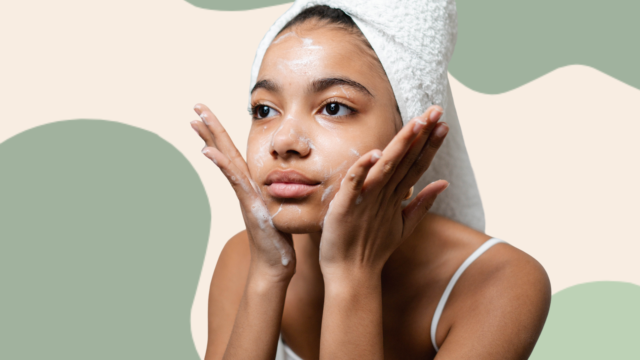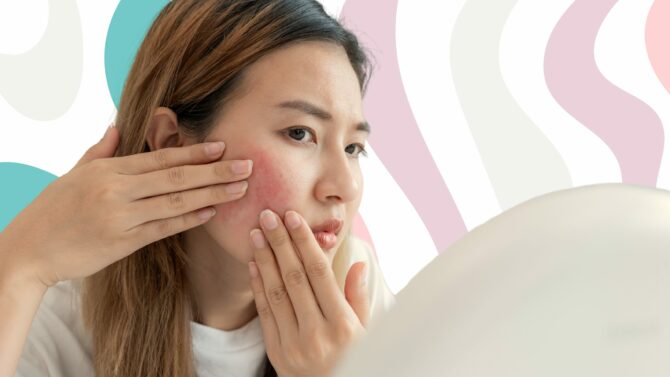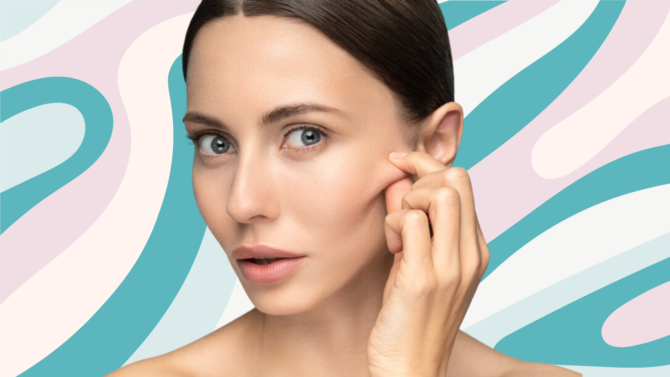What skincare is good for sensitive skin?
You may need to become a bit of a detective to work out if there are particular ingredients that your skin doesn’t like (and you may need a magnifying glass, because the ingredients list, printed on the packaging of any product, is always in really small print).
The first thing to avoid is fragrance (listed as ‘parfum’ on most products), so look for products that announce that they’re ‘fragrance-free’. It is also worth checking whether products contain the common fragrance ingredients linalool (derived from lavender oil) and limonene (coming from lemon essential oil). These find their way into 95% of personal care products and can be irritating to the skin, so they’re worth watching out for.
Look for skincare that is specifically formulated for sensitive skin. Dermatologists generally recommend those with sensitive skin use a fragrance- and soap-free cleanser, moisturise twice a day with a gentle moisturiser, and wear a sunscreen with UVA protection. Moisturising is especially important because it rebuilds and reinforces the skin barrier, which helps to calm and repair sensitive skin.
Some people like to look for skincare with a short list of ingredients – reasoning that the fewer ingredients there are, the fewer potential trouble-makers there will be among them. That rather depends on the ingredients. A product with a longer list of carefully balanced, soothing ingredients may be just what your skin needs.
Two types of skincare ingredients you should be cautious with are retinoids and alpha-hydroxy acids:
- Retinoids are by and large good for everything, including sensitive skin, if you can find a way for the skin to tolerate them— but they work by stimulating the skin to regenerate, so it is a delicate dance to get them to stimulate your skin into repairing itself without irritating it too much along the way, particularly when you first start using them. You can help the skin along here by using a barrier-repairing moisturiser, preferably one with ingredients such as ceramides, essential fatty acids and cholesterol, to strengthen and calm the skin and buffer the impact of the retinoid.
- Alpha-hydroxy acids, such as glycolic acid, exfoliate the skin and stimulate hydration in the skin, so they can help to improve the condition of sensitive skin. But given that over-exfoliation is a major cause of skin irritation, it would generally be a good idea to be careful with these while your skin is sensitive. That said, they do have a role in moisturising and improving the health of the skin—so if you want to use one, choose a milder type of AHA, like lactic or malic acid. A little harder to find, but easier on the skin, are PHAs (poly-hydroxy acids).
How can I prevent irritating sensitive skin?
Try not to physically irritate it—avoid touching or scratching at the sensitive skin, as this will make it worse and compromise the skin barrier even further. If your skin is feeling really on edge, even using a face flannel to wipe off your cleanser can be irritating, so splash your face with cold water to rinse instead. It’s also advisable to take short showers with water that is warm, not hot, and to gently pat your skin dry with a towel instead of rubbing it.
It is also important to figure out which ingredients or triggers you have a sensitivity to, and avoid these. This means checking ingredient lists on products, learning the patterns of your skin’s reactions, and using a minimal skincare regime of products chosen with care. You want to cleanse, calm and protect the skin, and be gentle with it. Try using a fragrance-free, kind-to-skin laundry detergent.
If you have tried excluding ingredients and minimising triggers, but you’re still experiencing issues with sensitive skin, you can have a patch test—a process whereby lots of irritants and allergens (more than 40 of them) are taped to your back and the reaction analysed a couple of days later. If you’re suffering from contact dermatitis and can’t find the trigger, then talk to your GP about getting referred to a dermatologist for a patch test.
As part of your skin protection, wear a high-factor sunscreen, as ultraviolet light will irritate the skin further. UVA rays penetrate through cloud cover and glass, so they’re present year-round and even when you’re indoors. So it’s very important to protect against these even on days when wearing a sunscreen feels a bit frivolous and unnecessary.
Lastly, when planning to use a new skincare product, test how your skin is likely to respond to it by dabbing a small amount behind your ear for a few evenings in a row, and leaving it on overnight. If the skin does not become irritated, do the same but near one of your eyes. This is a pretty good way of gently testing if your skin can tolerate this new product without risking your entire face becoming irritated.









 The Tweakments Chatbot
The Tweakments Chatbot